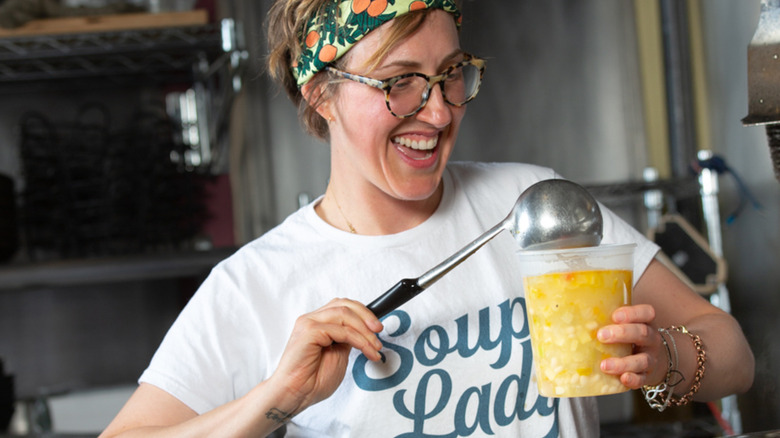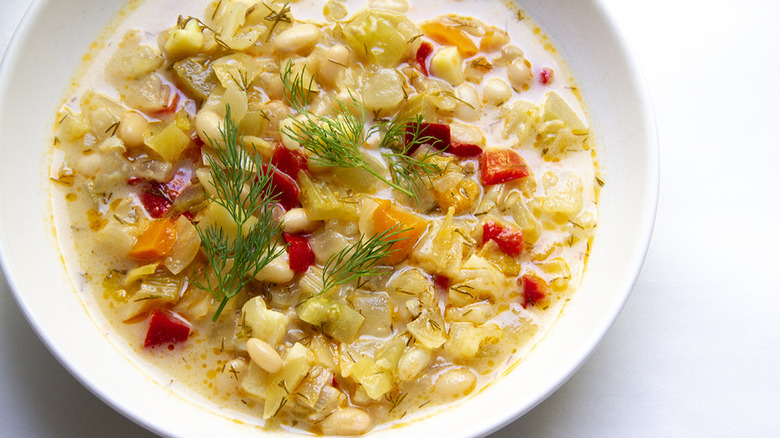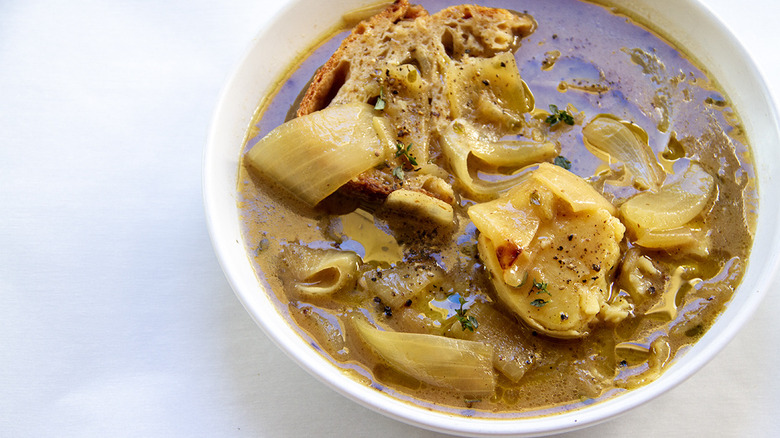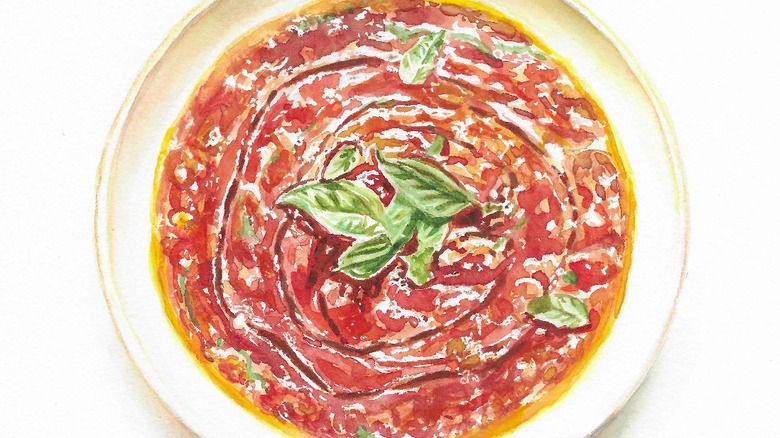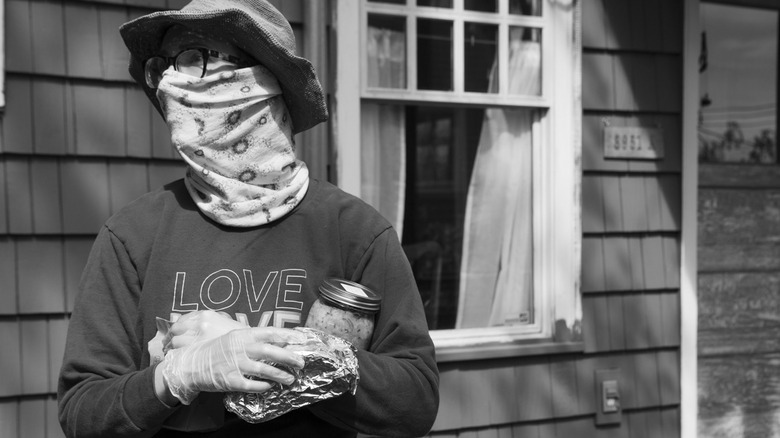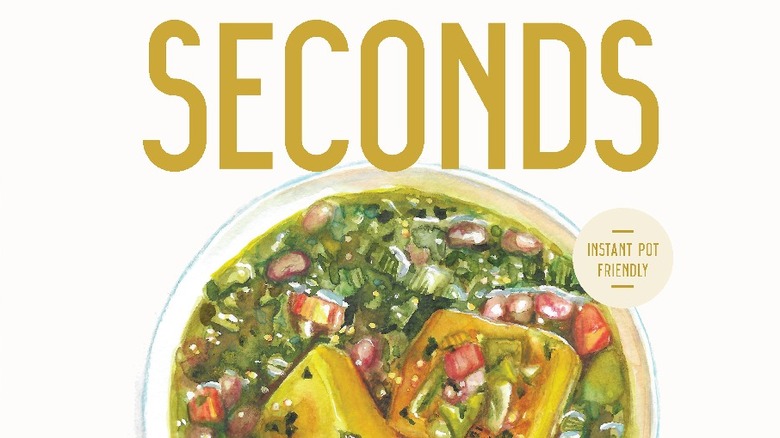The Heartwarming Story Of Caroline Wright, The Soup Queen Of Seattle
Caroline Wright's preparations for the launch of her second cookbook (aptly titled "Seconds") overlap with a personal milestone: her seventh (re)birthday. A day doctors warned her she and her family would likely never see after the Seattle-based professional chef, recipe developer, and writer was diagnosed with a rare and aggressive form of cancer known as glioblastoma in 2017.
For most, this diagnosis, which came just as her career was ascending, would be the beginning of the end, and quite literally, as most patients are estimated to have a year or so left to live (Wright included). But the months of fighting and healing to come would bring about a new life and perspective to Wright — much of which she tells through the lens of soup. And just like her first soup-themed cookbook ("Soup Club"), Wright's follow-up is about so much more than, well, soup.
Featuring endorsements from celebrated cookbook author Deborah Madison and James Beard winner J. Kenji López-Alt, "Seconds" is a reflection and dedication to the many soup cooks forced into action during the pandemic to deliver sustenance and comfort to themselves and those around them. To celebrate the cookbook's launch on January 31, we sat down with Seattle's soup queen to hear her heartwarming story, find out why she loves soup so much, and learn how it helped her connect to a sense of self and purpose while creating a network of compassion and soup enthusiasts.
Wright set her sights on a culinary career when young and hungry
Caroline Wright's determination has remained consistent throughout her life's many twists and turns. First, she earned a bachelor's degree in literature in three years, before enrolling in the École de Cuisine La Varenne in Paris. By her early twenties, she had graduated from culinary school, landed a job with Martha Stewart's Omnimedia, and was already on the path to a successful career in food.
Within a few short years, Wright had TV production and several cookbooks under her belt. Now in the stages of early motherhood to two young boys, she was completing a book tour, researching her third cookbook, and flying back and forth between Spain, Boston, Texas, and Seattle (where she and her husband had just taken up residence). To say the chef was busy would be an understatement.
Wright was busy "to a superhuman wild degree" when she started having headaches, as she told us. Consequently, she was perplexed but not completely surprised, and she originally pegged the headaches as panic attacks. However, while her doctor noted that could very well be the issue, the possibility existed that it could also be something else, as well. Wright says her doctor suggested she come in to have her ailment checked out, which would soon reveal her devastating and life-changing reality.
Wright received a diagnosed with a glioblastoma within two weeks
Looking back on the experience from a seven-year distance, Caroline Wright speaks honestly about the driving force behind her resolve to fight her cancer while attempting to retain her sense of identity — the one that existed beyond what was happening to her body. Wright told us she was "obviously distraught" about "being given a year to live," but she chose to develop a plan rather than cowering in fear over the unknown.
"I just decided that I was going to live that year like myself (and) was going to live my life until further notice," Wright explained. Driven in part by the realization that her body was likely going to fight the cancer no matter how she reacted, she figured it was best to live each day to the fullest rather than simply wait to die.
During this time, Wright grappled with her physical abilities, her role as a cook within the household, and the kind of food she wanted to eat and feed her family while being unable to cook herself. So, she set up a page on CaringBridge to share her experiences and ask for help via homemade soup — and the community responded in ways she couldn't have predicted.
For months, Wright received deliveries of homemade soup
Having resolved to make healing her full-time job, Caroline Wright sought the advice of everyone who could look at health from a new perspective, including homeopaths. She cross-referenced all the information and advice she received and committed to trying everything, including an anti-inflammatory diet that removed gluten.
Soup felt like the perfect vehicle for gentle digestion, though, allowing as much energy as possible to go towards healing. Thanks to her CaringBridge page, a soup-cooking community formed around the family. This became Wright's link to the outside world and helped fuel her own internal journey. "While I wasn't seeing people," Wright explained, "because I'm a cook, I would reheat a bowl of soup and just ... notice their knife cuts and wonder why they chose that recipe." Consequently, soup became a form of communication during her recovery.
After she'd survived the year her doctors had given her to live, Wright wondered what she would do next. She realized no one else was going to tell her it was time to resume living her life, so she took it upon herself to figure out the next step. Knowing she had to do something, she turned to the community that had been so beneficial to her recovery.
Soup Club became the foundation for her next cookbook
After completing her treatment, Caroline Wright began a new project — lovingly called "Soup Club" — making soup for those who had made it for her. Each week, Wright would cook and deliver homemade soup to people's porches and doorsteps. Not only did it resonate with the recipients, but it also restored Wright's self-confidence and identity as a cook. After all, she'd created a community of regenerative reciprocity. Friends and soup recipients would respond with paintings and poems, tapping into Seattle's vibrant creative community.
Wright's first soup-centered cookbook was a collective project that included her soup club's paintings, poems, and other creative endeavors. Soup Club is now a commercial business with over 100 weekly members. Wright traded memberships for contributions that went into the first book, creating another community (and form of communication) around soup. To ensure the focus remained on the people and community rather than soup, the photos accompanying the recipes are all in black and white.
Initially self-published via an over-funded Kickstarter campaign, "Soup Club" is now available through Amazon (having been picked up by Simon and Schuster and endorsed by Deborah Madison). Its first iteration was published just before the global pandemic took hold in the U.S. And with soup cooks forced to step up across the nation as everyone's world became smaller after the emergence of COVID-19, the bond through this collective act of caretaking became the basis for soup-based cookbook number two: "Seconds."
Seconds continues Wright's soup-centric career evolution
Made in the same manner as "Soup Club" (via a successful Kickstarter campaign), "Seconds" includes the stories of numerous soup cooks in the process of surviving, healing, and feeding others throughout the pandemic. Stories are told through words, paintings, and photography alongside 80 vegan and gluten-free soup recipes.
Wright was dead set on honing in and celebrating the talents and resources of her local community — and the universal lesson learned by many who lived through the pandemic. All creative contributions are from Seattle-based women (including the printing and selling of the book), and it will be stocked at the women-owned bookshop Book Larder. The choice showcases Wright's integrity and reflects the intimacy of community connections as a means of survival; from the weekly deliveries of a nourishing, humble bowl of soup to the creative works that have stemmed from it.
"I feel lucky in a thousand ways," Wright said, "everything means something important to me." Additionally, she feels there's a deeper reason she survived her ordeal. "There has to be a reason and I have to make good use of this time."
"Seconds" is available through Book Larder cookbook shop, and can be shipped internationally.
